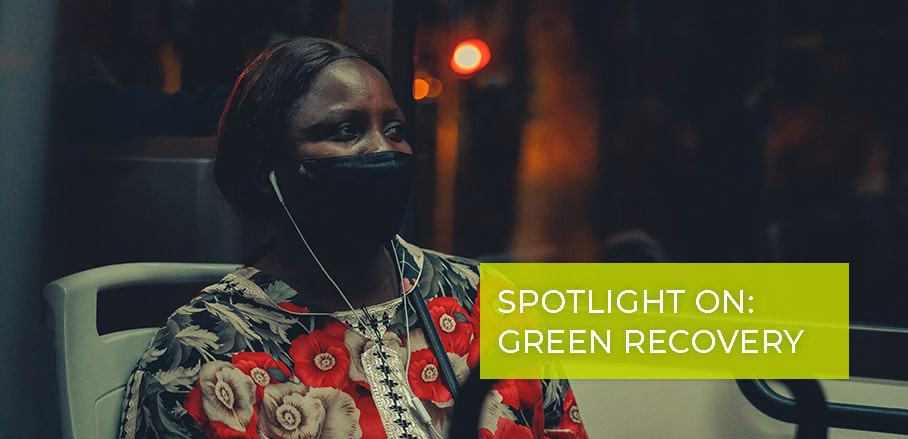The Future is Public Transport
To achieve the economic, social and environmental benefits of mass public transport, we need long-term sustainable public investment in systems which are accountable to citizens and workers. Social and climate justice must drive the Covid-19 recovery and guarantee that the future is public transport, argues Alana Dave.
“Some employers sold off their vehicles which led to loss of employment. I am one of the victims. So, I work once or twice a week. Since employers are negligent and mostly care about daily revenue targets, we must buy masks and sanitisers from the little we make. Already the women in urban transport are losing jobs and it is unlikely there will be new opportunities for them.”
The experience of this minibus conductor from Kenya captures the interlocking crises that our cities are facing. The Covid-19 pandemic has caused immense hardship and loss of life. While our efforts have been consumed by the pandemic response, we are also acutely aware of the climate crisis which is already striking some of the most vulnerable communities worldwide. Combine this with our failure to shift to a just and inclusive model of economic development, and the challenges seem immense.
How has the Pandemic Affected Public Transport?
We can see these trends play out in the area of public transport. Public transport workers have been on the front line during the pandemic, ensuring that vital services continue running so that other workers – especially nurses, doctors, and other health professionals – can continue travelling to combat the virus. Many have paid with their lives and long-term health. Meanwhile, the collapse in fare income resulting from lockdown measures means that public transport systems in many cities are creaking under a hefty financial burden. Cuts in operations and jobs are looking likely, especially where subsidies from local and central government are under threat from wider fiscal retrenchment. The impacts on informal public transport services and workers have been even more devastating.
Talking Green, Acting Grey
We know that expanding public transport is an essential component in decarbonising the global economy, shifting passengers from private vehicles into lower or net-zero emission public transport systems. The problem is that the development pathways pursued by many cities – encouraged by both business lobbies and financial institutions – are sending us precisely in the wrong direction. Many governments are talking green while acting grey, continuing to directly or indirectly subsidise forms of urban development that are incompatible with the UN Paris Agreement. The results – unreliable privatised services, more roads for more private vehicles, escalating air pollution and urban heating – are disastrous for both our communities and the natural environment.
How Do We Build the Public Transport Systems We Need?
The outlook is grim. That is why we at the International Transport Workers’ Federation (ITF) have launched The Future is Public Transport, a joint campaign with C40 Cities and other partners to build the just and sustainable public transport systems we need for the coming decades.
Our central idea is that public transport can be one of the key drivers for both economic recovery from the pandemic and a just transition. New research from C40 indicates that the right spending on public transport services and infrastructure could create 4.6 million jobs worldwide by 2030, cut urban transport emissions by more than half over the same period, and reduce air pollution from transport by up to 45 per cent. This presents a great opportunity to overcome all three crises at once.
Governments around the world – especially in the global north – are gearing up to launch economic stimulus packages to drive the post-Covid recovery. Public transport is a very wise option to back. Every job created for a bus driver or metro cleaner generates further opportunities for people to commute to other parts of a city, opening up further job market opportunities and helping drive inclusive growth. This is far more efficient – and healthy – than relying on uncoordinated private vehicle use.
Nevertheless, governments cannot simply increase funding levels for public transport and act as if the job is done. We have seen too many cases in which public funds have been poured into projects with minimal social benefits but plenty of scope for return to private investors. Even worse, privatising and outsourcing public transport services typically locks in public funding but allows businesses to skim profits off the top, all the while eroding labour standards and slacking on service quality. This is not the progressive future for our public transport systems that workers, passengers, and citizens want.
Instead, we must insist that both public ownership and good, green, unionised jobs are at the heart of any recovery from the Covid-19 pandemic. That means embedding strong labour standards where they already exist, but also enabling informal workers to transition into formal employment, enshrining gender equality in all workplaces, and providing secure employment opportunities for young people. In the best cases around the world, ITF-affiliated unions, public transport operators, and local governments are already working in partnership to make this a reality.
The route to recovery will of course look different in cities and countries around the world. One common feature is that no city can thrive in the 21st century without a well-funded, reliable, and green public transport system, owned by and accountable to the passengers who use it and the workers who run it. This is the moment to make that leap into the future. This is the moment for a transformative people’s public transport policy.
Together, we can make our cities better places to work and live beyond the age of Covid-19. “The challenges we face means we must be proactive, open, and dynamic. Sometimes we must think the unthinkable – we can’t be timid.” This call to action by John Mark Mwanika, the ITF’s chair of urban transport, is for all of us. The future is public transport.
- The Future is Public Transport - 22. June 2021
